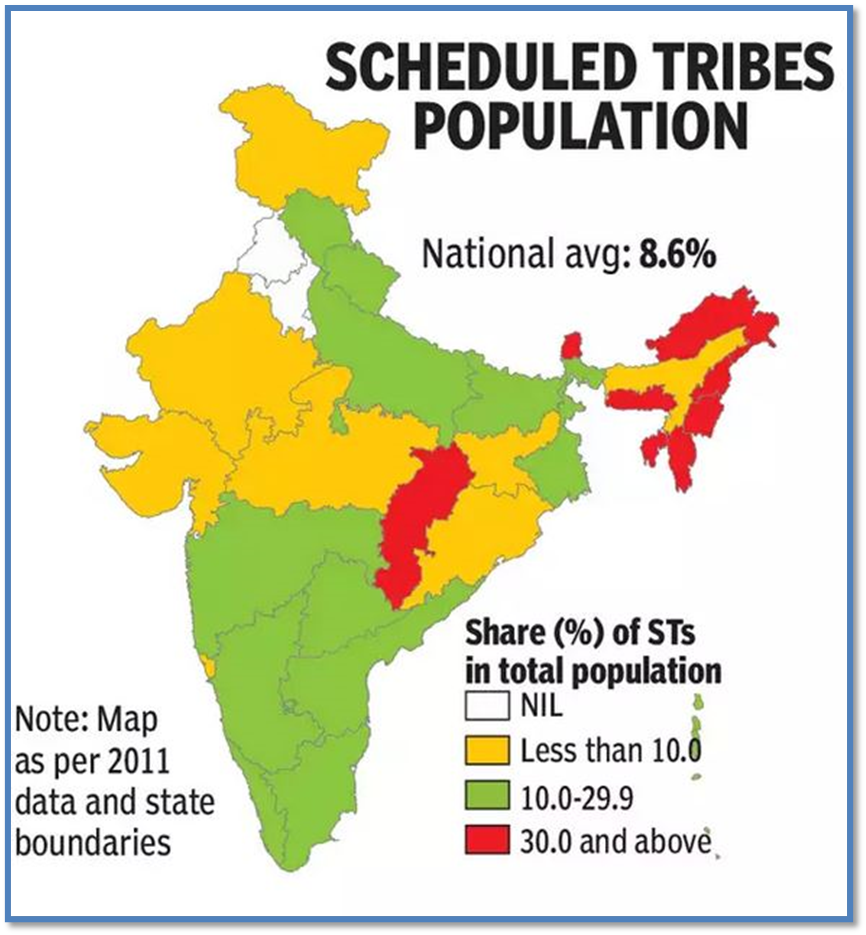National Bank for Agriculture and Rural Development (NABARD) is set to launch an integrated tribal development programme in Kulathupuzha grama panchayat, Kollam.

About ITDP
- Thanal, an environment organisation, will be the implementing agency of the project that aims to transform livelihoods of tribal families over the next five years.
- The five-year initiative targets the sustainable livelihood and agricultural enhancement of 413 families residing in eight hamlets.
- The programme focuses on promoting diverse agricultural crops such as pepper, arecanut, coconut, ginger, Thai ginger, turmeric, and plantain.
- It encompasses initiatives in goat rearing, poultry, beekeeping, fish farming, and fodder production.
- The establishment of a Tribal Farmer Producer Company (FPO) is also planned to further economically empower the community.
Components of the Programme
- Water Resource Development: Initiatives aimed at enhancing water resources for agricultural purposes.
- Leadership Training: Training sessions to empower local leaders within the tribal communities.
- Awareness Creation: Campaigns to raise awareness about sustainable practices and community development.
- Sanitation and Hygiene Initiatives: Efforts to improve sanitation and hygiene standards among the tribal families.
- Marketing and Branding Training: Training programmes to enhance marketing skills and brand awareness among participants.
- Skill Development Workshops: Workshops focused on enhancing both agricultural and non-agricultural skills among the tribal community.
About NABARD:
- It was established on July 12, 1982, based on the recommendation of the Sivaraman Committee to promote sustainable rural development and agricultural growth in India.
- Aim : To facilitate credit flow for the promotion and development of agriculture, small-scale industries, cottage and village industries, handicrafts, and other rural crafts.
- It operates as a statutory body under the Reserve Bank of India (RBI) Act, 1934, with its headquarters located in Mumbai.
- It is governed by a Board of Directors appointed by the GoI:
- Representatives from the RBI;
- Central and state governments;
- Experts from various fields related to Rural Development and Finance.
Functions of NABARD:
- Refinance Support: NABARD provides refinance facilities to banks and financial institutions for agricultural and rural development activities, including crop loans and rural infrastructure projects.
- Financial Inclusion: It promotes financial inclusion by expanding banking services in rural areas, supporting SHGs, FPOs, and MFIs, and facilitating access to credit for rural communities.
- Priority Sector Lending: NABARD plays a crucial role in channelling credit to priority sectors such as agriculture, small-scale industries, and rural infrastructure, in alignment with the Reserve Bank of India’s priority sector lending guidelines.
- Direct Lending: It extends direct loans to institutions for specific rural development projects, such as agricultural production, rural infrastructure development, and agri-processing units.
- Scheme Implementation: The organization administers government schemes and funds like Rural Infrastructure Development Fund (RIDF), Watershed Development Fund (WDF) to finance rural infrastructure projects and watershed development activities.
- Credit Planning: NABARD collaborates with central and state governments, RBI, and other stakeholders to formulate credit policies and plans for agriculture and rural sectors.
- Research and Training: NABARD promotes research and development in agriculture, supports capacity building and training programs for rural stakeholders, and facilitates technology transfer initiatives.
PYQ UPSC Prelims : (2013)
Ques : Which of the following grants/grants direct credit assistance to rural households?
1. Regional Rural Banks
2. National Bank for Agriculture and Rural Development
3. Land Development Banks
Select the correct answer using the codes given below:
a) 1 and 2 only
b) 2 only
c) 1 and 3 only
d) 1, 2 and 3
Ans : c)

